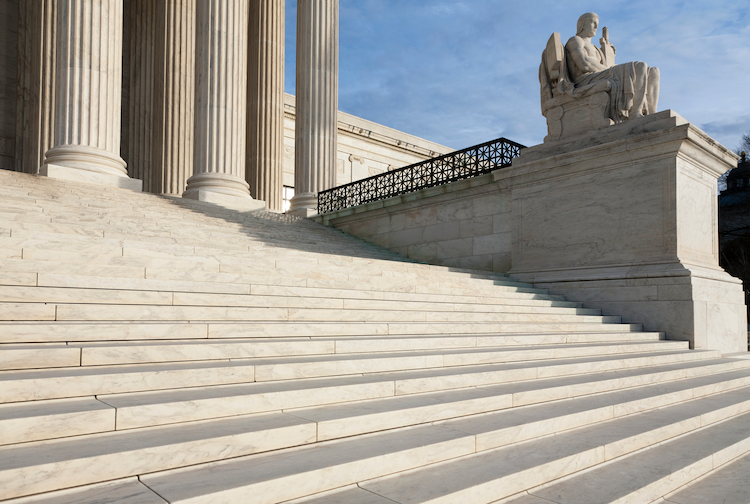SCOTUS Ends February Sitting With Oral Arguments in Six Cases

The U.S. Supreme Court held oral arguments in six cases to end its February sitting. A pair of cases challenging Texas and Florida’s controversial social media laws took center stage.
NetChoice, LLC v. Paxton and Moody v. NetChoice, LLC center on states’ ability to regulate major social media platforms like Facebook, YouTube, and X (formerly known as Twitter). While the state laws are slightly different, both limit social media platforms’ ability to engage in content moderation by removing, editing, or arranging user-generated content. Both laws also require platforms to provide individualized explanations for certain forms of content moderation and mandate that platforms provider general disclosures about their content-moderation practices.
In the Florida case, the Eleventh Circuit Court of Appeals held that S.B. 7072’s content-moderation and individualized-explanation provisions likely violate the First Amendment. However, a divided panel of the Fifth Circuit Court of Appeals held that NetChoice was unlikely to succeed in any of its challenges to the Texas law, H.B. 20. It held that platforms’ content-moderation activities are “not speech,” but rather “censorship” that States may freely regulate without implicating the First Amendment.
The Supreme Court is now poised to resolve the Circuit split and clarify when social media moderation runs afoul of the First Amendment. The specific issue before the justices is “[w]hether the First Amendment prohibits viewpoint-, content-, or speaker-based laws restricting select websites from engaging in editorial choices about whether, and how, to publish and disseminate speech — or otherwise burdening those editorial choices through onerous operational and disclosure requirements.”
Below is a brief summary of the other cases before the Court:
- Cantero v. Bank of America: At least thirteen states have enacted laws requiring mortgage lenders to pay a minimum interest rate on funds held in mortgage escrow accounts. Pursuant to 15 U.S.C. § 1639d(g)(3), Congress has expressly required national banks to comply with these state escrow-interest laws where applicable. The question before the Court is: “Does the National Bank Act preempt the application of state escrow-interest laws to national banks?”
- McIntosh v. United States: The procedural criminal law case asks the justices to decide “[w]hether a district court can enter a criminal forfeiture order when the time limit specified in the Federal Rules of Criminal Procedure has already passed.”
- Coinbase, Inc. v. Suski: The arbitration case involveswhether, where parties enter into an arbitration agreement with a delegation clause, an arbitrator or a court should decide whether that arbitration agreement is narrowed by a later contract that is silent as to arbitration and delegation.
- Garland v. Cargill: The closely watched gun case involves whether a “bump stock,” a device designed and intended to permit users to convert a semiautomatic rifle so that the rifle can be fired continuously with a single pull of the trigger, is a “machinegun,” which is banned under federal law. The specific question before the Court is: “Whether a bump stock device is a ‘machinegun’ as defined in 26 U.S.C. § 5845(b) because it is designed and intended for use in converting a rifle into a machinegun, i.e., into a weapon that fires ‘automatically more than one shot … by a single function of the trigger.’”
Decisions in all of the above cases are expected by the end of the term in June. Please check back for updates.
Previous Articles
Justices Skeptical of Trump Administration Tariffs
by DONALD SCARINCI on December 18, 2025
The U.S. Supreme Court heard oral arguments in Learning Resources, Inc. v. Trump (consolidated with...
SCOTUS Takes Up Key Election Case Involving Mail-In Ballots
by DONALD SCARINCI on December 17, 2025
The U.S. Supreme Court recently granted certiorari in a key election case, Watson v. Republican Nat...
SCOTUS Adds Second Amendment Case to Docket
by DONALD SCARINCI on November 27, 2025
The U.S. Supreme Court will consider another important Second Amendment case this term. The latest ...
The Amendments
-
Amendment1
- Establishment ClauseFree Exercise Clause
- Freedom of Speech
- Freedoms of Press
- Freedom of Assembly, and Petitition
-
Amendment2
- The Right to Bear Arms
-
Amendment4
- Unreasonable Searches and Seizures
-
Amendment5
- Due Process
- Eminent Domain
- Rights of Criminal Defendants
Preamble to the Bill of Rights
Congress of the United States begun and held at the City of New-York, on Wednesday the fourth of March, one thousand seven hundred and eighty nine.
THE Conventions of a number of the States, having at the time of their adopting the Constitution, expressed a desire, in order to prevent misconstruction or abuse of its powers, that further declaratory and restrictive clauses should be added: And as extending the ground of public confidence in the Government, will best ensure the beneficent ends of its institution.





